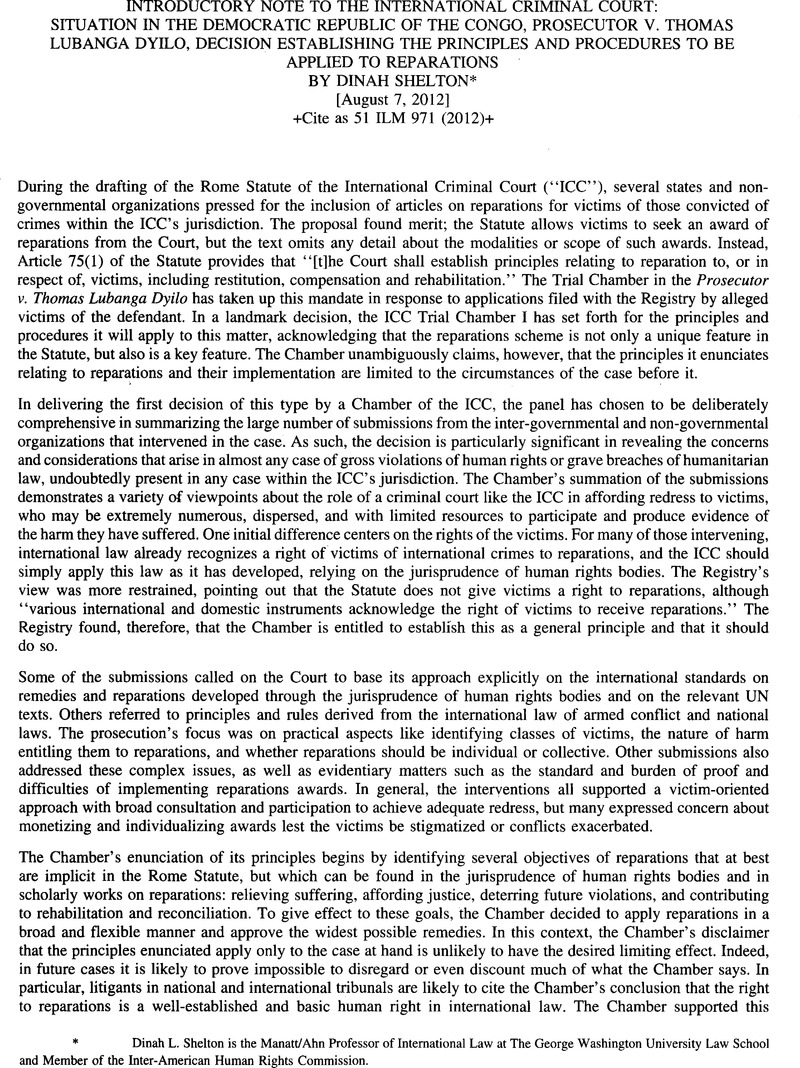No CrossRef data available.
Published online by Cambridge University Press: 27 February 2017

* This text was reproduced and reformatted from the text available at the International Criminal Court Web site (visited November 15, 2012) http://www.icc-cpi.int/iccdocs/doc/docl447971.pdf.
1 The Universal Declaration of Human Rights, G.A. Res. 217A (III), U.N. Doc. A/810 (Dec. 10,1948), provides that “[e]very-one has the right to an effective remedy by the competent national tribunals for acts violating the fundamental rights granted him by the constitution or laws.” The International Covenant on Civil and Political Rights, Dec. 16, 1966, 999 U.N.T.S. 171 (entered into force Mar. 23, 1976), contains three separate articles on remedies. The first, Article 2(3), obliges the states parties to the Covenant to afford an effective remedy to a victim notwithstanding that the violation has been committed by persons acting in an official capacity; to ensure that claims are heard by competent judicial, administrative or legislative authorities; and to ensure that the competent authorities shall enforce such remedies when granted. Articles 9(5) and 14(6) add that anyone unlawfully arrested, detained, or convicted shall have an enforceable right to compensation or be compensated according to law. The Convention on the Elimination of Racial Discrimination, Dec. 21, 1965, 660 U.N.T.S. 195 (entered into force Jan. 4, 1969), Article 6, requires that States Parties assure to everyone within their jurisdiction effective protection and remedies, through the competent national tribunals and other state institutions, against any acts of racial discrimination in violation of the Convention, as well as the right to seek from such tribunals just and adequate reparation or satisfaction for any damage suffered as a result of such discrimination. A similar provision requiring effective protection of women from discrimination is found in Article 2(c) of the Convention on the Elimination of All Forms of Discrimination against Women, Dec. 18, 1979, 1249 U.N.T.S. 13 (entered into force Sept. 3, 1981).
2 The European Convention on Human Rights modeled its general remedial provision—Article 13—on Article 8 of the Universal Declaration of Human Rights. The European Court of Human Rights has interpreted Article 13 to guarantee an effective remedy “to everyone who claims that his rights and freedoms under the Convention have been violated.” See Klass v. Germany, 28 Eur. Ct. H.R. (ser. A) (1979). For serious violations, Article 13 entails, in addition to the payment of appropriate compensation, a thorough and effective investigation capable of leading to the identification and punishment of those responsible and including effective access for the relatives to the investigatory procedure. European Convention Article 5(5) requires compensation for breach of the right to be free from arrest in violation of the provisions of Article 5. Article XVII of the American Declaration of the Rights and Duties of Man, May 2, 1948, O.A.S. Res. XXX, 43 AM. J. Int’l L. Supp. 133 (1949), guarantees every person the right to resort to the courts to ensure respect for legal rights and to obtain protection from acts of authority that violate any fundamental constitutional rights. The American Convention on Human Rights goes further, entitling everyone to effective recourse for protection against acts that violate the fundamental rights recognized by the constitution “or laws of the state or by the Convention,” even where the act is committed by persons acting in the course of their official duties. See American Convention on Human Rights art. 25, Nov. 22, 1969, OEA/ser.L/V/II.23, Doc. 21 Rev. 6 (1979), O.A.S.T.S. No. 36 at 1 (entered into force July 18, 1978). These obligations are linked to the fair trial provisions of Article 8, which requires the state to provide a fair hearing before a competent, independent, and impartial tribunal. Article 10 of the Convention further provides that every person has the right to be compensated in accordance with the law in the event he has been sentenced by a final judgment through a miscarriage of justice. The African Charter on Human and Peoples’ Rights, June 27, 1981, O.A.U. Doc. CAB/LEG/67/3 Rev. 5, (1982), 21 I.L.M. 58 (entered into force Oct. 21, 1986), has several provisions on remedies. Article 7 guarantees every individual the right to have his cause heard, including “the right to an appeal to competent national organs against acts violating his fundamental rights as recognized and guaranteed by conventions, laws, regulations and customs in force.” In addition, Article 21 refers to “the right to adequate compensation’ in regard to ‘the spoliation of resources of a dispossessed people.” Article 26 imposes a duty on states parties to the Charter to guarantee the independence of the courts and allow the establishment and improvement of appropriate national institutions entrusted with the promotion and protection of rights and freedoms guaranteed by the Charter.
3 Article 3 of the Hague Convention Respecting the Laws and Customs of War on Land, Oct. 18, 1907, 187 C.T.S. 227, 1 Bevans 631 (entered into force Jan. 26, 1910), obliges contracting parties to indemnify for a violation of the regulations. Similarly, Protocol I to the Geneva Conventions of 12 August 1949, and Relating to the Protection of Victims of International Armed Conflicts, June 8, 1977, 1125 U.N.T.S. 3, states that any party to a conflict that violates the provisions of the Geneva Conventions or the Protocol “shall... be liable to pay compensation.”
4 Basic Principles and Guidelines on the Right to Remedy and Reparation for Victims of Gross Violations of International Human Rights Law and Serious Violations of International Humanitarian Law, G.A. Res. A/RES/60/147 (Dec. 16, 2005).